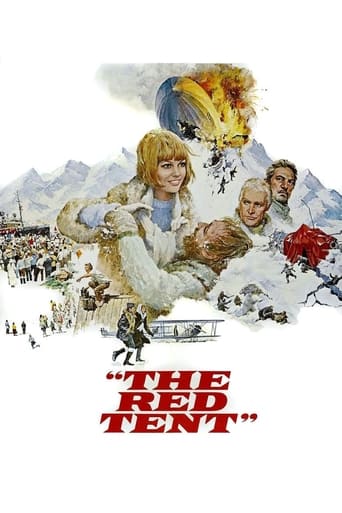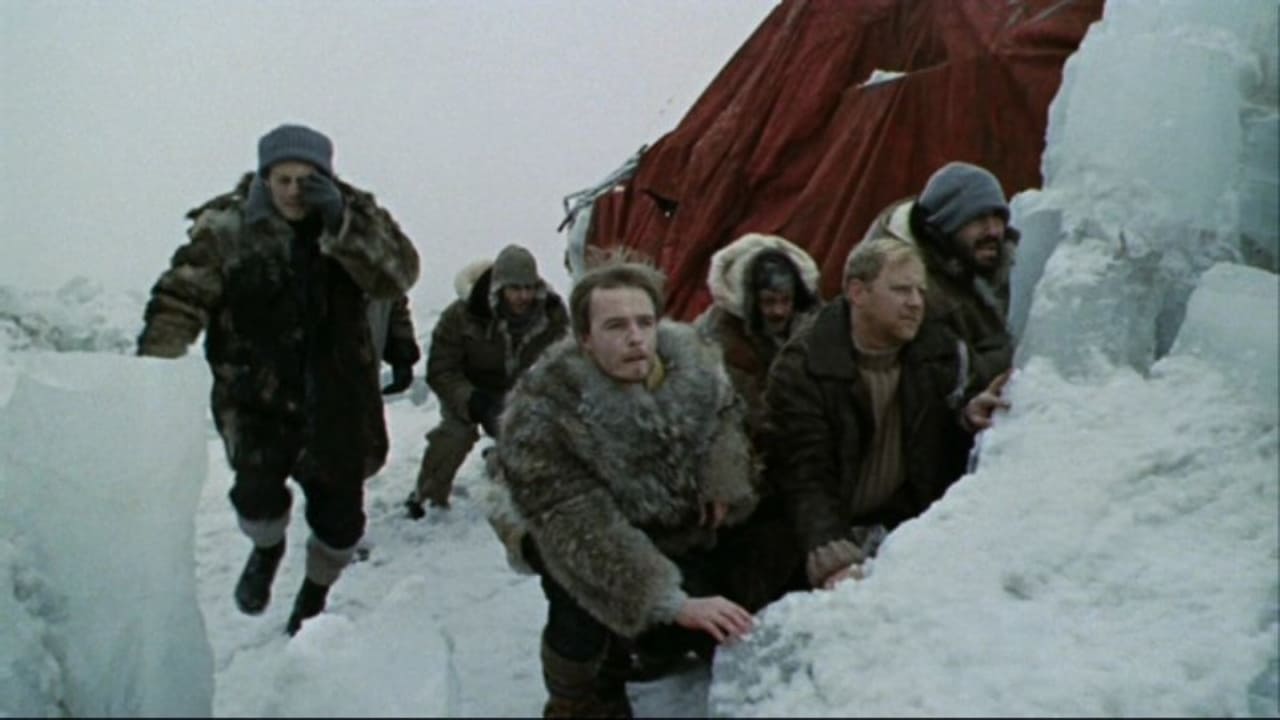slightlymad22
The Red Tent (1969)Plot In A Paragraph: Torn by personal guilt Italian General Umberto Nobile (Peter Finch) reminisces about his 1928 failed Arctic expedition aboard the airship Italia.Not many people have seen this movie, it runs a little too long, and it's not what I'd call an enjoyable movie, but that doesn't mean it isn't a good one. The entire movie takes place in the generals mind. He calls back various participants to the events, to re-live what happened, and then ultimately pass judgement on him. It's well directed, well acted and it has a nice score tooAttempting to rid himself from Bond, it is the first time Connery would play the wiser, older man, he turns up late on, in what is only a supporting role (at best) or a glorified cameo. The Red Tent was another Connery movie to fail at the box office.
oOgiandujaOo_and_Eddy_Merckx
An English language film starring Peter Finch, Sean Connery, and Claudia Cardinale, this is nonetheless pure Kalatozov, more imbued with man's madness than Herzog. General Alberto Nobile (Finch) takes airship Italia to the North Pole in what appears to be no more than a public relations effort, with pretensions of scientific endeavour. The film is reminiscent of an earlier Kalatozov effort Neotpravlennoye pismo / The Unsent Letter (1960) in terms of there being a love interest, and also many people looking for explorers in peril and specifically in terms of the representation of joy (wacky music and speed). Kalatosov and Mosfilm were no doubt inspired by a real-life story where Uncle Joe's bestest commies manage to save a bunch of foolhardy imperialists. This seems to be a favourite theme of superior Soviet drama, and the film reminded me of the Soviet sci-fi film Nebo zovyot / Call of the Heavens (1962) in many ways, including Soviet harbour scenes of cheering crowds and self-sacrificing efforts to save the deluded. The film at least acknowledges that the first successful expedition to the North Pole was American, and so some of the revolutionary fervour I'd come to expect had diminished by this stage in Kalatosov's career. There is however a glorious purely dogmatic shot of a Russian sailor heaping coal into a furnace which has coloured him red.The film is not condescending in that there is a genuine awe and respect for the great polar explorers. Roald Amundsen's spectral presence (played by Sean Connery) is magnetic and haunting.Another cinematic precursor of this one may be Battle of the River Plate (1956), also starring Peter Finch, a film fascinated with the concept of historical spectacle. The actual crash is a matter of history, indicated at the start of the film and is not a spoiler. The filming of the crash is spectacular and crazy glorious cine-trauma.Finn Malmgren is one of the most interesting characters, he has a death wish, a love of the emptiness and Arctic loneliness. I think maybe it's something that they all share. Why would anyone venture into this morass of crumbling ice otherwise? The film is framed by a trial, Nobile trying himself, in his mind, for the disaster, this is very trippy.
CelluloidDog
This Italian-Russian endeavor is a lost treasure and one of the great historical dramas. The movie is really a dream of General Nobile, a survivor and commanding officer of the Italia, a dirigible that met with disaster in a grand Artic exploration during the Mussolini era. It is about the psychology of guilt, accountability, and leadership. Beyond the human psychological profile of the film, it captures the harsh, expansive grandeur of nature better than almost any movie I've seen. The cinematography of the Artic is unlikely to be ever met again with the computer-generated film of today. The Russian ice-breaker ship which rescues the Italian crew survivors requires no special effects and remains a challenge for today's movie producers to emulate. The iceberg film sequences were spectacular. Sean Connery, Claudia Cardinale, Peter Finch and the rest of the cast give very fine acting performances. Ennio Morricone composes one of his greatest scores. As great as a film composer he is, he still is not remembered for one of his most haunting compositions in this film. There is an equally beautiful soundtrack in the Russian version by composer Aleksandr Zatsepin. It is a shame this film was not recognized perhaps in part due to its Soviet influence in a Hollywood-dominated market. It is a bit rough around the edges (meaning editing and directing could be smoother) but in terms of great film-making, it rarely gets better. When you watch it a couple times, you begin to appreciate the raw beauty and human drama of this film.
aimless-46
Since viewing this film 35 years ago I have been in awe of it, it is certainly my all-time favorite and would most likely get my nomination for best film ever. On this point I probably stand in splendid isolation (or to quote Finn Malmgren: "emptiness, loneliness, beauty, and purity"). I mention this in the hope that this will encourage readers to view the film. If you are seeking a comparison, "Krasnaya Palatka" ("The Red Tent") is most like the original "Flight of the Phoenix"; both are superficially action adventure films, with deep allegorical elements about the dynamics behind the functioning of a civilized society. "The Red Tent" even gets a little philosophical along the lines of life as a journey and not a destination.This is Director Mikheil Kalatozishvili's tribute to Sergei Eisenstein, a disorienting yet organized montage of vast scale juxtaposed with claustrophobic confinement (its worth watching again just to focus on the scene transitions-the editing is brilliant). The scenes inside the dirigible and the red tent (the title character) are carefully cut into spectacular exterior shots of arctic landscapes and the dynamic energy of crowds in the Russian countryside and city. There is a fusion of European expressionism with Hollywood realism in this film unlike anything I have ever seen before. This is possible because of the storytelling device of having everything unfold in flashbacks by the main character General Nobile (Peter Finch). Nobile was the organizer and commander of Italy's ill-fated attempt to reach the North Pole by dirigible. This generally true (certain historical liberties are taken to simplify things) story is told entirely from his point of view. Forty years after the expedition Nobile is a disgraced figure living in Rome and burdened by guilt and sleeplessness. You learn that on sleepless nights he conjures up participants in the expedition fiasco (both members and rescuers), letting them judge him for his actions 40 years ago. These sessions have been largely inconclusive but this night he pulls out all stops and convenes a full trial in his living room-with almost all the central figures present. More importantly, for the first time he names the ruthless Lundborg (Hardy Kruger) as his prosecutor-a move that Lundborg assures him will mean that the jury will reach a verdict for the first time. These are not ghosts but rather figments of Nobile's imagination and they behave according to his perception of how they would behave. This storytelling device allows the film to have its own commentary, making it not just an exciting adventure film with wonderful visuals, but an examination of the concept of leadership (much like "Command Decision", "A Gathering of Eagles", and "They Came to Cordura"). More importantly it becomes an allegorical study about free will and destiny, as careful planning and good judgment are just two factors in any complex operation; subject to luck and unforeseen events.The many characters are a representative cross section of society; with heroes, opportunists, martinets, dreamers, and average Joes. Ultimately, things happen (both good and bad) not because of the challenge of man versus nature, but because of the placement and misplacement of human resources (i.e. the right or wrong person assigned to a particular role in the expedition and the rescue efforts). From the events portrayed in the "The Rent Tent" it is difficult to fault Nobile as a leader. He wisely turns back to Kings Bay when the weather gets bad, he is genuinely devastated at the loss of some of his men, and his actions after the crash are all reasonable. He can be blamed for allowing Lundborg to bring him out before his men but under the circumstances it was a sensible decision if not a politically correct one. As Samoilovich, Captain of the Russian Icebreaker Krassin points out, a leader is judged by their actions, and their actions by their results, Nobile's early rescue is the reason the other surviving crewmen are ultimately rescued.Nobile's fantasy trial eventually dredges from his subconscious the realization of why he choose to leave with Lundborg (1000 reasons to stay-1001 to leave). That such a trivial and self-indulgent reason was the difference maker accounts for his continuing guilt. This realization, along with the belief that Amundsen (his peer) is the only one fit to judge him, allows Nobile to finally forgive himself for being human. They go out with Amundsen's advice to reflect not on their failures but on the things they attempted and the wondrous things they saw. There is no guilt in not achieving an ambitious goal, making the attempt is more important than succeeding. The music is also great.Then again, what do I know? I'm only a child.



 AD
AD


